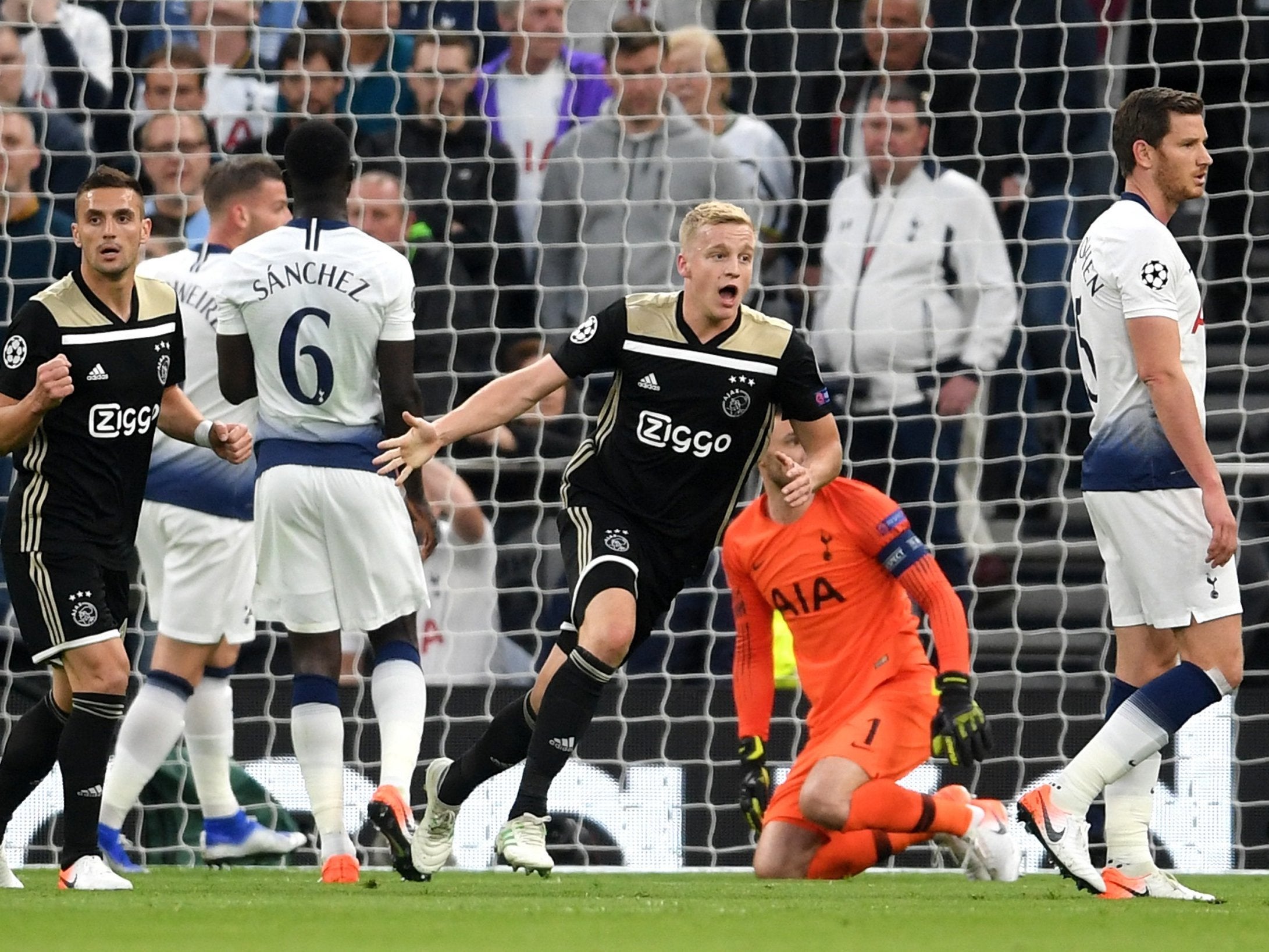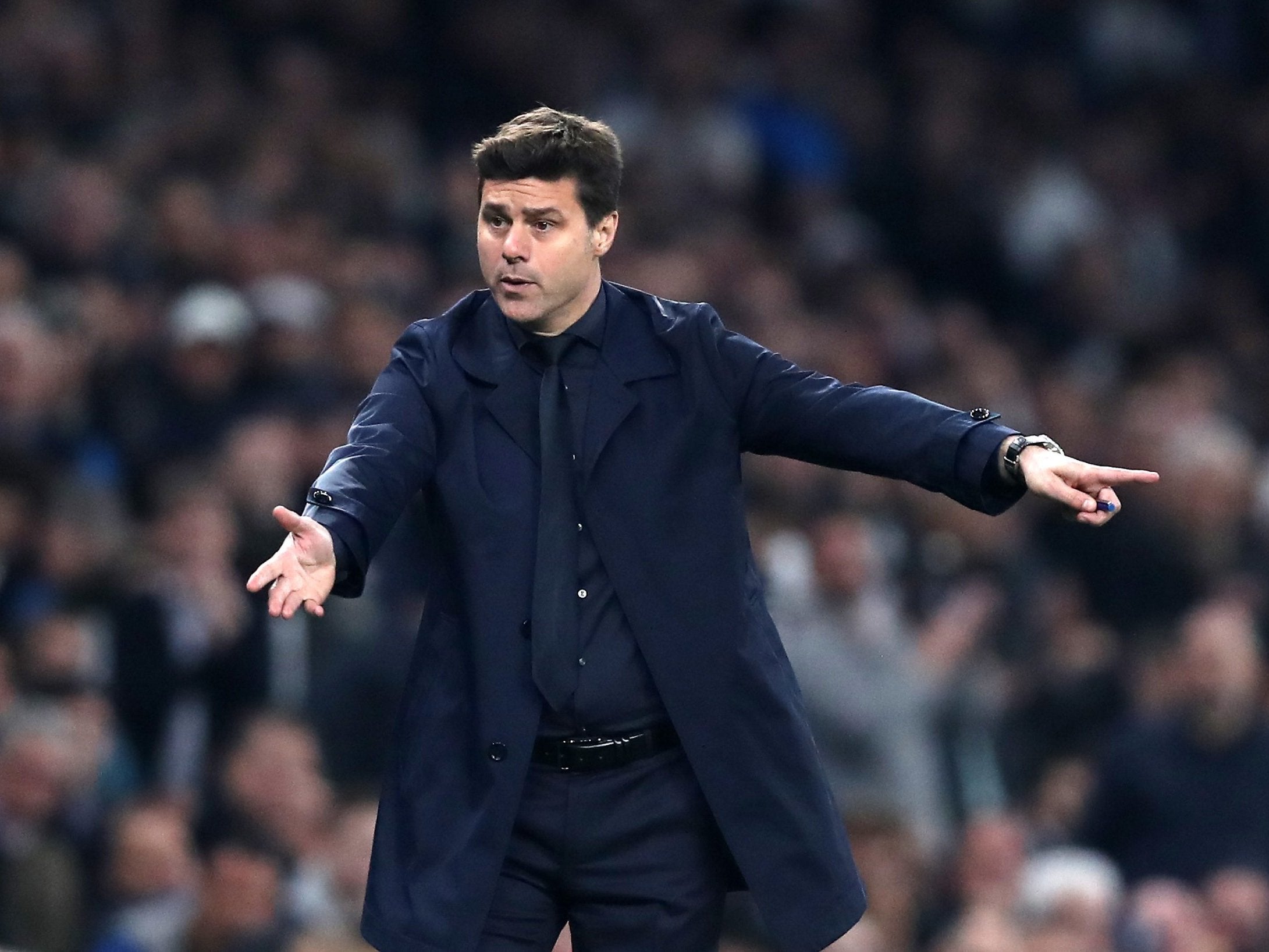Tottenham vs Ajax: Mauricio Pochettino left wondering how badly can you mess up a first leg and still go through?
Spurs didn't produce anywhere near their best in giving up a deficit that, in truth, could've been more - but, crucially, they remain in the tie ahead of the second leg in Amsterdam next week
How badly can you mess up your tactics in a Champions League semi-final and still go through? That’s the theory Tottenham will be hoping to put to the test in Amsterdam in a week’s time.
Mauricio Pochettino doesn’t really like talking about tactics. Not in public, at least. For him, football games are won by vigour, by courage, by basic manliness. “The team didn’t show the energy we wanted to show,” was his explanation for Tottenham’s dismal first half-hour against Ajax on Tuesday night. “They [Ajax] showed more energy than us.”
It was Tottenham’s great fortune that Ajax only scored one goal during that early period of dominance. The last hour - a fraughter, scrappier affair - may not have produced the equaliser for which Tottenham were striving. But it may well have kept them in this semi-final.
Perhaps we shouldn’t have been surprised at the way the game panned out. It’s not the first time Tottenham have been swept aside in the early stages. This was, remarkably, the fifth time this season that they’d gone behind in the first 15 minutes of a Champions League game. Not once - in 11 attempts - have Tottenham led at half-time in a European game this season. In a way, it’s a miracle they’re still standing.
As Pochettino would later admit, Tottenham’s tactics were largely determined by the available personnel. In the absence of Harry Kane and Son Heung-Min, Fernando Llorente probably had to start with Lucas Moura. But the immobile Llorente was a poor fit for a high-intensity running game, and a back three a poor option against a team who play without a conventional striker, Dusan Tadic often disappearing out of the front line.
And so, unable to hold the ball up in the final third, unable to keep it in their own third, and unable to play it into midfield through the feral intensity of Ajax’s first press, Tottenham simply surrendered possession again and again.
A measure of any system is how it enables the strengths of your best players. By common consent, Tottenham’s best available players were Christian Eriksen and Dele Alli. Eriksen was stationed in a deeper role, alongside Victor Wanyama in a midfield two. This is fine if you’re intending to see lots of the ball, and perhaps that’s what Pochettino was envisioning: an early blitz that would allow Tottenham to take control of the game.
But against a quick, top-quality midfield like Ajax, you need someone in there who can break things up. Eriksen didn’t make a single tackle or interception until the 44th minute, and perhaps most damningly of all, he didn’t commit a single foul. Tottenham are often very good at using tactical fouls to deter breaks and upset opponents’ rhythm. But here, such was Ajax’s speed and movement that Tottenham weren’t able to get close to them.
Dele, meanwhile, played further forward, in a sort of floating, scavenging No 10 role. Perhaps Pochettino intended him as a dangerous overlap runner when Llorente and Lucas got hold of the ball. Certainly it was hard to see what else he was there for, as he drifted around the margins of the game, head craned upwards to track the path of long balls he knew he would never get near. “Oh my god, so bad,” was Ruud Gullit’s verdict on Qatari television. Dele touched the ball eight times in the first 40 minutes.
So what changed in the second half? And what did it tell us about how the second leg might pan out?

The first lucky break for Tottenham - though it didn’t seem that way at the time - was when Jan Vertonghen busted his nose open and had to come off. On came Moussa Sissoko, as Tottenham reverted to a 4-2-3-1. Sissoko offered an extra outlet in midfield, but most of all he offered yards: the speed and the coverage to get to the ball, and the tenacity to hassle you off it. Eriksen has the first; Wanyama has the second; only Sissoko, among Tottenham’s current midfielders, has both.
Afterwards, Ajax coach Erik ten Hag argued that Tottenham had gone for a “more direct” approach, which was only partly true. Spurs completed 26 long passes in the first half and 27 long passes in the second half. The big difference was that their extra body in midfield allowed them to pick up more of the second balls, which then allowed them more opportunities to build play. “We pushed them deeper, started to press in the way we wanted to press,” Pochettino said. “The second half gives us hope for the second leg in Amsterdam.”
But how much hope? The fact that Tottenham enjoyed the better of the second half should reassure them that Ajax are not in a different class technically: superior in many areas, perhaps, but not outlandishly so. With Son poised to return and perhaps even Kane on the verge of a comeback, Tottenham should be able to break with more pace and fluency in the second leg.

Equally, though, what should we read into the fact that Tottenham’s drastic improvement failed to coagulate into a single clear chance? Indeed, perhaps the best opportunity was Ajax’s: had David Neres’s second-half shot crept in rather than hitting the post, this tie might well have been over already. And yet it was a strangely subdued second-half display from Ajax: mature and resilient, certainly, but occasionally a touch casual in possession, and certainly lacking in the pop and fizz of their early forays.
“Winning 1-0 in Tottenham is an amazing result and an amazing starting point,” said ten Hag. “But we have to learn lessons from this match. We can do a lot better. We need to keep the ball in our team longer.”
This, perhaps, is the one real note of warning for Tottenham. There are plenty of reasons for them to be optimistic: their second-half performance, the return of Son, the fact that Ajax didn’t get a second away goal, the numerous second-leg comebacks that have been seen in the Champions League this season. It wasn’t their best night, and there’s plenty of scope for improvement. Trouble is, you could say exactly the same about Ajax.
Join our commenting forum
Join thought-provoking conversations, follow other Independent readers and see their replies
Comments
Bookmark popover
Removed from bookmarks